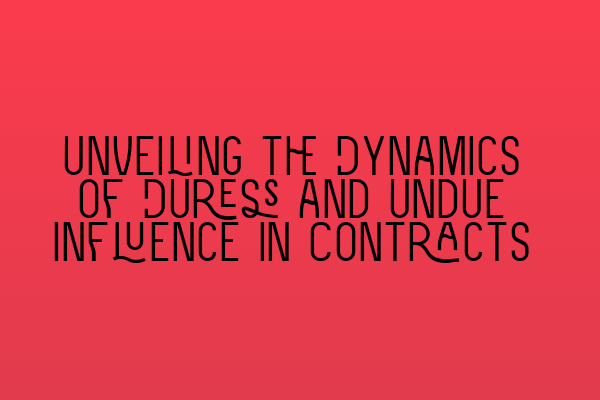Unveiling the Dynamics of Duress and Undue Influence in Contracts
Contract law is a cornerstone of the legal system, governing the relationships and agreements between parties. However, not all contracts are created equal, and some may be influenced by external factors that undermine their validity and fairness. Two such factors are duress and undue influence, which can significantly impact the enforceability of a contract.
Understanding Duress
Duress refers to a situation where one party is compelled to enter into a contract against their will under the threat of harm or other forms of coercion. This can include physical violence, blackmail, economic pressure, or even psychological manipulation. Duress essentially negates the element of voluntary consent required for a legally binding contract.
Examples of duress include situations where a vulnerable party is forced to sign a contract under the threat of physical violence or where a party is economically coerced into accepting unfair terms due to their desperation. In such cases, the party subject to duress may seek legal remedies to have the contract set aside.
Uncovering Undue Influence
Undue influence occurs when one party exerts excessive control and influence over another, leading to a lack of free will and independent decision-making in the contract formation process. This can occur in situations where a party with a position of power or authority takes advantage of a vulnerable party.
Undue influence can be categorized into two forms: actual undue influence and presumed undue influence. Actual undue influence requires evidence that one party actively manipulated and dominated the decision-making of the other party. Presumed undue influence, on the other hand, arises in situations where there is a special relationship between the parties, such as a fiduciary or confidential relationship, which is inherently prone to undue influence.
Challenging Duress and Undue Influence
If you find yourself faced with a contract that has been entered into under duress or undue influence, it is crucial to understand your legal options. Challenging the enforceability of such contracts can be complex, but with the assistance of an experienced contract law solicitor, you can navigate the process effectively.
When challenging a contract based on duress, you will need to provide evidence that the threat, coercion, or pressure was present and had a direct impact on your decision to enter into the contract. This can be done through witness testimonies, documentation of any threatening communications, or expert opinions on the nature of the duress.
Similarly, when challenging a contract based on undue influence, you will need to establish that the dominating party had a disproportionate amount of power and influence over you, leading to your lack of independent decision-making. This can be demonstrated through a thorough examination of the circumstances surrounding the contract formation, including any power imbalances or breaches of fiduciary duty.
The Importance of Seeking Legal Assistance
Contract law can be intricate, and navigating the complexities of duress and undue influence requires legal expertise. By engaging the services of a knowledgeable contract law solicitor, you can strengthen your case and increase your chances of successfully challenging an unfair contract.
At SQE Contract Law, we understand the nuances of contract disputes and have a team of experienced solicitors who can help you unveil the dynamics of duress and undue influence in your contract. Our expertise in contract law, coupled with our dedication to client advocacy, ensures that you receive comprehensive and strategic legal representation.
If you’re looking to practice and hone your skills for SQE exams, check out our SQE sample papers to improve your chances of exam success. Additionally, adjusting your SQE strategy based on mock performance can be crucial, so make sure to read our article on adjusting SQE strategy based on mock performance for valuable insights.
Peer discussions and collaboration are also essential in the learning process, so consider reading our post on peer discussions post-mock to discover the benefits of learning from collaboration and feedback. Furthermore, if you’re looking to improve your approach to SQE exams, our article on adjusting strategy based on mock performance and targeted practice for improvement might be just what you need.
At SQE Contract Law, we believe in empowering aspiring solicitors and helping them strengthen weak areas in SQE. Read our article on strengthening weak areas in SQE to discover how targeted practice can lead to significant improvement.
Contact SQE Contract Law today to uncover the dynamics of duress and undue influence in your contract. Our team of legal experts is ready to assist you and provide the professional guidance you deserve.
